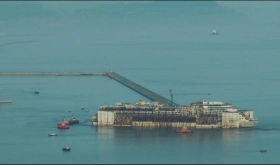In the recent English High Court case of Sang Stone Hamoon Jonoub Co Ltd v. Baoyue Shipping Co. Ltd. ([2015] EWHC 2288 Comm), Mr Justice Males provided direction on the potential liability of a cargo owner to the shipowner where the first does not take delivery of the cargo and the recompense such shipowner may expect in return. In this case, the unpaid FOB seller of the goods, who held the bill of lading (BL), was found liable to the shipowner for storage charges greater than the value of the unpaid cargo. The shipowner successfully defended a claim for unlawful conversion following storage of cargo that had not been collected within a reasonable time. Under English law, in brief terms, conversion of cargo is an act of dealing with that cargo in a way that is inconsistent with the cargo owner’s rights, such that the cargo owner is deprived of the use or possession of the cargo.
FACTS OF THE CASE
A cargo of iron ore was carried on board the defendant shipowner’s vessel, the “Bao Yue”, from Bandar Abbas in Iran to Tianjin in China. The BL, issued by the defendant shipowner, was issued “to order” and did not name a consignee or notify party. The BL incorporated the terms of the applicable voyage charter party, including that in case the original BL was not available upon arrival at Tianjin the shipowner had the option to discharge the cargo to a ‘custom – bonded warehouse’. Because of a dispute re unsettled balance of purchase price of the cargo under the separate sale contract on FOB terms concluded between the claimant shipper as seller and the buyer (being also the charterer), the BL was retained by the shipper in Iran. Upon the vessel’s arrival at Tianjin, no BL was presented and the defendant shipowner discharged the cargo into a custom – bonded warehouse. The cargo remained in storage for three and a half years and the claimant shipper did not make any effort to collect it. Consequently, the storage charges eventually turned out to exceed the value of the cargo (storage charges more than US$2 million against the contract value of the cargo being US$1.2 million) and the warehouse owner refused to release the cargo until the accrued storage charges had been paid.
THE JUDGMENT
The shipper’s claim against the defendant shipowner for damages for unlawful conversion of the cargo based on creation of a lien in favour of the warehouse owner for its storage charges and on denial of shipper’s access to or possession of the cargo failed on both counts and the defendant shipowner counterclaimed for storage charges. The Court ruled as follows:
i) The shipper had authorised the shipowner to store the cargo, both expressly by email (the shipper having instructed the master “trust you will take appropriate measures to prevent any inconvenience in future”) and through the charterparty, and impliedly due to the well-established law of bailment applicable to a situation where the BL holder (the shipper in this case) who is under an obligation to take delivery as the owner of the goods at the discharge port fails to do so. The shipowner was also subsequently entitled in the circumstances to create a lien for the necessary resulting storage costs under the terms of the BL since “the creation of a lien is a reasonable and foreseeable incident of the storage contract which the bailee (shipowner) is authorised to conclude”.
ii) The Court also found that there was no conduct which constituted denial of access to the cargo or a “deliberate encroachment” on the rights of the shipper. The cargo remained at the warehouse at all times such that it ‘is and always has been available to the claimant shipper to take control thereof on presentation of the original BL and payment of the storage charges which have accrued’ and
iii) The Court finally held that the shipper is liable to reimburse the defendant shipowner for the reasonable storage charges as and when they are paid to the warehouse owner and an order was made requiring the original BL to be surrendered by the shipper to the defendant shipowner to enable the cargo to be sold and the storage charges to be paid.
COMMENTS
The outcome of this case serves as a guidance to the circumstances in which unlawful conversion of a cargo may arise. It also highlights the BL holder’s continuing duty to take timely delivery of the cargo irrespective of a potential breach of the underlying distinct sale contract; and if it is unwilling or unable to do so, to do what is necessary to mitigate any loss and expense suffered as a result of the cargo being undelivered to prevent a deadlock reflected in this case; otherwise serious, inter alia financial, implications which go beyond the sale contract dispute itself and can affect the chain of all contractual relationships (i.e. the contract of carriage) may occur. While withholding the BL can often provide leverage and good security to the seller in a claim for outstanding payment against a buyer, nevertheless this may backfire should the seller (in this case the holder of the BL) elect to take belated actions re delivery of the cargo or even worse absolve itself from any responsibility thus leaving the cargo ‘stranded’ in storage or on a vessel and eventually putting the substance of its (lawful) claim in jeopardy implying a “waiver by conduct” and negatively affecting its relationship with the shipowner. What this ruling does not address is whether the buyer was entitled to refuse to make the further payment due under the sale contract and, therefore, whether it or the seller was in breach of the sale contract. A decision on that point would determine who is ultimately responsible for the storage charges, as between buyer and seller and provide us with a more comprehensive and well-founded perspective as to the obligations and liabilities of each contracting party. A shipowner, on the other hand, can expect to be reimbursed for expenses incurred when cargo interests fail to collect their cargo on discharge and original BL is not presented on the discharge port – provided that the wording of the BL permits same.
On another note, time and commercial expediency may often dictate to a shipowner to discharge and store the cargo where an original BL is not presented at the discharge port. Since risks and exposures are associated with such actions (such as a misdelivery claim which is likely to prejudice the shipowner’s P&I club cover or lack of physical and effective control of the cargo once discharged from the vessel to customs controlled warehouses or holding areas pending collection by the cargo owner etc.), the shipowner should be careful and proactive while considering the contractual provisions regarding such discharge and storage. It would be recommended for the shipowner to seek its P&I Club’s advice in this respect and insert a clear and tailored wording in the applicable exclusion or limitation of liability provision in the BL and the incorporated charterparty terms on which it could safely rely.
ABOUT THE AUTHOR
 |
Iliana Koukoutsi is an Associate in the Shipping Department of Dingli & Dingli Law Firm, Malta. Her scope of work focuses on registration of commercial vessels and yachts, incorporation and legal support of shipping companies, ship sale and purchase and ship financing and mortgaging. |














Leave a Comment